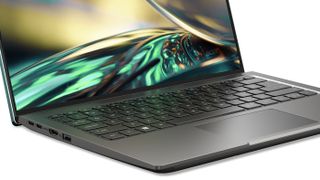Due to skyrocketing COVID demand for desktops and notebooks from businesses and individuals, PC makers ran into trouble building enough computers and procuring ample components. However, as store shelves are now mostly stocked, PC demand has slowed due to inflation and uncertainties caused by the war in Ukraine. As a result, Acer chairman Jason Chen warned this week that an oversupply of notebooks is coming.
Consumer PC Demand Weakening
Rising prices of energy, food, and other critical items have resulted in record inflation rates around the globe. As a result, many people are reconsidering their spending habits and cutting back on technology purchases. In general, the recent months were not particularly good for client PC sales in the consumer sector, reports DigiTimes. Acer, Asus, and HP indicated in the recent weeks that the consumer market was showing signs of weakness and demand was decreasing.
"From a demand perspective, we expect to continue to see strong commercial demand with some softening of the consumer businesses," said Enrique Lores, President and CEO of HP, at the company's earnings call on May 31. "From a supply perspective, we see two quarters of constraints. First is the industry-wide component shortages that we expect will continue through fiscal 2022; second, are the COVID-related disruptions in China, which we expect will primarily impact fiscal Q3."
HP's commercial PC sales were up 18% year-over-year in Q2 2022, whereas sales of the company's consumer systems declined by 6% YoY. In terms of product categories, increased prices and higher sales of premium systems drove notebooks revenue by 3%, increased desktop revenue by 28%, and boosted workstation sales by 21% year-over-year.
According to IDC, softness in consumer PC demand will reduce 2022 PC shipments by 8.2% compared to the previous year. Desktop and laptop PC shipments reached 348.8 million units in 2021, so they are forecast to decline to 321.2 million units this year.
Inventories Becoming Liabilities
Ever since PC demand started to outpace supply in Q2 2020, PC makers have worked overtime to procure components and build up inventory to meet demand. Leading PC makers like Acer, Dell and HP bought chips directly from their developers/manufacturers and stockpiled them to avoid disruptions to their supply chains.
Now that demand for consumer PCs is dropping (albeit not to pre-pandemic levels), their inventories are becoming liabilities as oversupply leads to price drops, which is good for the end-user but not good for business. In fact, Acer's chairman reportedly said that the supply of laptops had already outpaced demand.
Companies like Acer, Asus, Gigabyte, and MSI typically sell to consumers, so they will suffer from softening demand, particularly for entry-level and midrange systems. DigiTimes recalls that based on first-quarter balance sheets, the inventory value of Acer, Asus, MSI, and Gigabyte increased year-over-year by 26.59%, 79.51%, 77.62% and 64.59%, respectively. The inventory buildup could be good if demand were there, but now that it is weakening, they could become losses since some components and finished goods lose value quickly.
However, not all PC makers suffer from softening demand or worry about oversupplying the market. For example, if you buy a MacBook Pro 14/16 from Apple today (either in the U.S. or Europe), the company won't be able to deliver it until August. The systems are available for pickup from select Apple stores, though.

